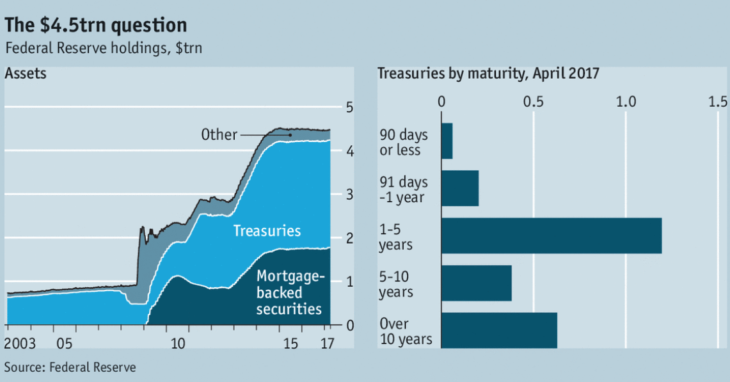I just spent the past few days at the annual economics meetings in Atlanta, in some ways a depressing experience. (I arrived home with a cold.) I discovered that I’m not making any headway in convincing people of the importance of monetary offset of fiscal stimulus. Even worse, there seems to be a growing consensus that monetary policy is ineffective at the zero bound. I view this idea as not just wrong, but silly.
Today I’m going to suggest a seemingly inconsequential reform that might improve policy by removing a misconception about monetary stimulus at the zero bound, the false idea that aggressive QE involves vague “costs and risks”.
During the period of quantitative easing, some Fed officials worried that an excessively large Fed balance sheet could expose the Fed to the risk of capital losses, perhaps even bankruptcy. In fact, these so-called “risks” are an illusion, as Fed holdings of Treasury bonds represent an asset for the Fed and an equal liability of the Treasury. Because the Fed’s profits go to the Treasury, any gains or losses on its investments are a wash.
Fed officials know this, but worry about the “optics”. What if they had to go to Congress and ask for a bailout because they’d bought a lot of Treasury bonds, which had subsequently declined sharply in value when interest rate rose? If there was then a sudden upsurge in spending requiring a tight money policy, then the Fed might not be able to sell enough assets to hold down inflation. Hence the need for a bailout. Of course this scenario is extremely unlikely, but fear of embarrassment is a very powerful human motivator.
Because this is a phony problem there is a very simple solution—abolish the Fed’s balance sheet. Have the Treasury take over the responsibility of conducting open market operations to adjust the monetary base. Have banks hold reserve accounts at the Treasury, not the Fed. After all, didn’t the framers of the Constitution intend that the Treasury would have the duty of “coining money”?
Otherwise, nothing would change. The Fed would still make all the monetary policy decisions, just as they do now. The Fed could still be independent. The only difference is that once the FOMC had decided on a course of action, the instructions would be sent to the Treasury, not the NY Fed’s open market desk. The Treasury would be nothing more than an errand boy, with no discretionary power to determine monetary policy
The beauty of this system is that the Fed would no longer have to worry about going bankrupt. Would the Treasury now be assuming this risk? No, because there never was any risk to assume, it was all a cognitive illusion. The markets would now know that the Fed would be free to do whatever it takes to hit their target (whether inflation or NGDP.) And that would allow the Fed to do far less.
It’s conceivable that (at the zero bound) even a policy of buying up the entire national debt would not be enough to hit the Fed’s target. I think that’s very unlikely in the US, and extremely unlikely if a couple reforms are adopted at the next zero bound event:
1. No payment of interest on bank reserves.
2. A switch to level targeting of prices once interest rates fall to zero, as Bernanke has proposed.
In my view, there is now a pretty strong consensus in favor of those two steps, or something similar.
Inevitably, people ask what the Fed should do if even those steps are not enough. In that extremely unlikely case, I’d suggest the Treasury buy as many alternative assets as necessary to hit they target. I.e., the Treasury would essentially be borrowing money to create a sovereign wealth fund. I call that “monetary policy”, but I don’t really object to people calling it “fiscal policy” if they prefer. The point is that we should never, ever, ever react to a depressed economy with tax cuts and/or higher spending—do it all with money creation. Tax cuts and spending increases balloon the deficit, putting a burden on future taxpayers. A sovereign wealth fund merely adds a bit of risk, with no extra expected future tax burden.
But you should probably just ignore the previous paragraph; in reality the Fed won’t need to go that far.
To summarize:
For decades, we’ve wrongly assumed that the Fed is a bank. It’s not. It’s a monetary authority.
Because we’ve wrongly viewed the Fed as a bank, we’ve assumed it has a “balance sheet” like other banks. It does not.
Because we’ve wrongly assumed the Fed had a normal balance sheet, we’ve wrongly assumed it could suffer from a bankruptcy that would hurt taxpayers. That’s false. Its assets are a liability of the Treasury.
Because we’ve wrongly assumed there was balance sheet risk, we’ve wrongly assumed that highly aggressive QE might be “risky”. It isn’t.
Because we’ve wrongly assumed that aggressive QE might be risky (if only the feelings of Fed officials who might have to ask Congress for a bailout), we did too little QE, creating millions of excess man-year of unemployment during 2009-15.
Please, let’s abolish the Fed’s balance sheet and give the Treasury the responsibility to adjust the monetary base. I also favor abolishing IOR. But if that policy is to be maintained, then have the Fed set the IOR rate while the Treasury makes the actual payments to banks. (Ditto for discount loans, another facility I’d abolish.)
PS. Here’s a graph from The Economist showing the maturity of the Fed’s bond holdings in 2017:
